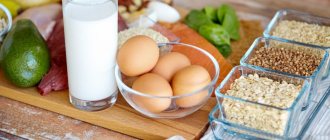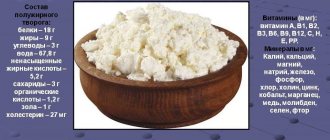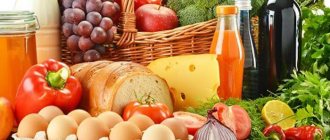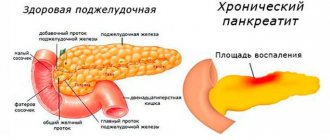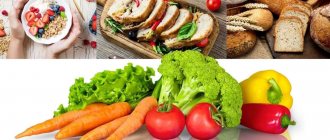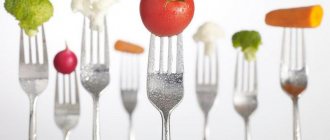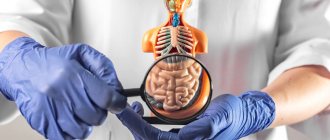The cause of food intoxication can be a poorly cooked steak, stale fish, ready-made food from a restaurant, an exotic dish, or poorly washed fruit. If food is prepared incorrectly or from expired products, it can cause poisoning. Along with bad food, pathogenic bacteria enter the body, which cause intestinal intoxication.
In case of poisoning, it is very important to take timely measures to remove toxins, as well as follow a diet. A proper diet will help the adult body get into shape faster.
Basic nutrition rules
The recovery period requires compliance with some rules of food intake:
- The first day after poisoning is the most difficult for the body. At this time, it is better to avoid eating food, with the exception of low-fat broths.
- The poisoned person drinks heavily. You can drink herbal teas, rice water, mineral water, rehydron and other electrolyte solutions. But it is necessary to focus on clean drinking water.
- The liquid is drunk in small sips, little by little, so as not to provoke new vomiting.
- If you have an acute feeling of hunger, you can eat a soft cracker or a small piece of dried wholemeal bread.
- Eating on the second day is also undesirable. There are no restrictions on how much water you can drink.
- Two days of fasting ensure cleansing of the intestines from toxins and harmful bacteria. On the third day, appetite returns and some foods return to the diet.
[media=
https://youtu.be/Z2erGkxXM2o
]
If you neglect them and continue to eat as usual, you can cause a relapse of unpleasant symptoms of poisoning.
The diet will include light food that does not burden the stomach. It is important to choose foods that are easily digestible. A gentle diet is maintained for 5-10 days.
The total daily diet at this time is divided into 5-6 meals in small portions.
If a person eats relatively hard food, it is thoroughly chewed or pre-chopped. Porridges are cooked exclusively in water, cutlets are steamed. Also, food should not be too cold or hot.
Nutrition after rotavirus poisoning
A diet for rotavirus infection, or intestinal flu, is mandatory, since it helps eliminate symptoms as quickly as possible and alleviate the patient’s condition. The most important thing is to start eating properly from the very first day of illness so that recovery occurs as quickly as possible. First of all, with such a disease it is necessary to maintain the body, avoiding dehydration.
All the symptoms of this unpleasant disease strive to push moisture out of the body, but without it we cannot exist!
That is why, first of all, you need to start drinking water, preferably slightly salted. Due to a sharp disruption of the digestive tract, most of the enzymes that usually break down food cease to be produced, which is why it is important to switch to the most gentle regimen, in combination with taking drugs like mezim, activated carbon and others. In addition, it is useful to take probiotics - if not in the form of medicine, then at least in the form of dairy products. So, what can you eat after rotavirus poisoning:
- low-fat or low-fat kefir, cottage cheese, fermented baked milk, yogurt;
- steamed or boiled vegetables;
- viscous porridges on water - oatmeal, semolina, rice;
- omelette, steamed or oven-cooked.
The diet is not too varied, but you will not have to follow it for long: only on days of acute illness. The diet after rotavirus infection allows you to gradually introduce other foods, especially those that do not have a laxative effect.
The danger of diarrhea when a person needs medical attention
Although in many cases diarrhea can be treated at home with over-the-counter remedies, rest, and a temporarily restricted diet, if it lasts long enough, you should consult your doctor. Contact a specialist if
:
- your diarrhea lasts more than two days without improvement;
- you become dehydrated.
Dehydration and diarrhea
Diarrhea can cause you to lose fluid quickly and put you at risk of dehydration. If you don't get treatment for diarrhea, it can have very serious consequences.
Symptoms of dehydration include
:
- fatigue;
- dry mucous membranes;
- increased heart rate;
- headache;
- frivolity;
- increased thirst;
- decreased urination;
- dry mouth.
We recommend
“Good carbohydrates: list of foods for weight loss” Read more
If you are dehydrated or have other symptoms, you may need to go to the emergency room to receive immediate treatment.
Other symptoms to look out for include black or bloody stools, severe abdominal pain, or fever (39°C) or higher.
Diarrhea
- a serious disease for young children. This can cause severe dehydration in an infant in just one day.
Get treatment right away if any of the following conditions apply to your child:
- Diarrhea for 24 hours or more.
- Temperature 39°C or higher.
- Bloody stool.
- Stool containing pus.
- The stool is black and tarry.
These are all symptoms that indicate an emergency.
Authorized products
There is a list of foods that you can eat during the recovery period without fear for your health:
- rice and buckwheat - cereal crops help restore strength reserves, are prepared exclusively on a water basis without milk, in the form of porridges;
- dried slices of loaf or bread made from wholemeal flour (it is allowed to purchase the finished product in the store, but without flavoring or other additives);
- cookies without cream, dry type;
- small portions of lean chicken or veal;
- lean boiled fish;
- low-fat chicken broth, noodles, pearl barley soup;
- mashed bananas, baked apples;
- jacket potatoes;
- boiled or stewed vegetables;
- grated carrots;
These products are easily digestible, do not irritate the stomach and do not overload it with unnecessary work.
Pure water, non-carbonated mineral water, weak green tea, decoctions of strengthening herbs (decoction of St. John's wort, rose hips, black currant, blueberry), and jelly are allowed to drink.
Pregnant women who are unlucky enough to be poisoned while carrying a child should follow a diet with particular strictness and be careful with the food they eat, adding, among other things, berry fruit drinks.
Reviews
Vladimir Aleksandrovich, 54 years old I am an experienced mushroom picker. But recently my instincts failed me, and I poisoned myself with mushrooms. I spent several days in the hospital under IV drips. And after 2 weeks I adhered to a special diet. In addition to it, at the insistence of doctors, I took Regidron, Hilak Forte and a vitamin complex. It took a little over a month to recover.
Natalya Lvovna, 45 years old At night, she mistakenly took the wrong medicine for a headache. Against the background of an overdose, nausea and vomiting appeared 20 minutes after taking the medicine. A little later my stomach started to hurt. Only then did I notice that I had taken the wrong drug. She called an ambulance. At the hospital, they performed gastric lavage and recommended drinking plenty of fluids. For vomiting, they injected Cerucal, then gave me a sorbent to drink. Further treatment was carried out at home: she followed a strict diet.
What can't you eat?
There is a whole list of foods that are strictly not recommended to be consumed during illness. They provoke peristalsis, irritate the intestinal mucosa, and aggravate diarrhea. And therefore, they have a detrimental effect on the condition of the sick person. What to avoid:
- fresh baked goods - white bread, buns, any products made from fine flour;
- pasta;
- wheat, pearl barley, barley cereals;
- whole milk and all dishes made from it;
- sour milk, especially fatty milk. For this type of product, restrictions apply only for the acute period. When the condition improves, low-fat kefir and cottage cheese should be introduced little by little;
- raw vegetables and fruits;
- meat and fish of fatty varieties;
- preserved, smoked and spicy dishes;
- fried and fatty foods;
- sauces, mayonnaise, ketchup;
- any mushrooms;
- sweets, candies, chocolate, baked goods;
- coffee and strong black tea;
- alcoholic drinks of any strength.
All of the above things are delicious foods that are loved by almost everyone. But don’t despair, this won’t last forever. After recovery, they gradually return to the diet. The diet after rotavirus infection is not as strict as in the acute period and during recovery, but nevertheless... In order to avoid worsening the condition and the return of unpleasant symptoms (nausea, vomiting and diarrhea), you need to adhere to certain dietary principles for at least 10-14 days .
The thing is that during illness the intestinal mucosa suffers. The recovery period for epithelial cells is approximately two weeks. If you put stress on a fragile organ at this time, the condition may worsen.
Recommended diet for an adult
For the first week, an adult is recommended to adhere to a certain gentle diet, which prevents new stomach cramps and bouts of vomiting. It is not advisable to eat in the first two days, but the diet in subsequent days looks like this:
| Breakfast | Lunch | Dinner | Dinner | |
| Third day | Semolina porridge with water, jelly, two crackers; | Biscuits or other dry cookies, blackcurrant decoction; | A small portion of boiled cod, low-fat chicken broth; | 40g rice porridge and lean chicken breast, steamed; |
| Fourth day | Crackers, tea, cottage cheese casserole; | Rosehip decoction, banana puree; | Buckwheat porridge with fish cutlets cooked in the oven; | Mashed potatoes with water, grated carrots - 50g; |
| Fifth day | Kissel, curd pudding; | Baked apples, crackers - 2 pieces; | Soup with rice and vegetables; | Jacket potatoes, two boiled eggs, steamed; |
| Sixth day | Dry cookies without creams and fillings, tea, semolina soufflé; | Kissel, baked pear; | Oven-baked chicken, pearl barley; | Pumpkin puree soup; |
| Seventh day | Buckwheat, grated carrots, tea; | A small portion of cottage cheese casserole; | Chicken noodle soup, baked pumpkin salad; | 50g. turkey, mashed potatoes; |
Starting from the sixth day, it is not necessary to strictly follow the menu - you are allowed to supplement it with other familiar light dishes. The main thing is to listen to your own body, observe the sensations you experience. If any symptoms of poisoning reappear, you should return to strict adherence to the diet.
Dish recipes
There are many recipes for dishes suitable for a diet after food poisoning. You can diversify the menu by adopting the following options.
Stuffed pepper
Bell peppers, peeled from seeds, need to be doused with boiling water and kept under a closed lid for 10 minutes. During this time, you need to boil the rice and chicken fillet. In a frying pan, add chopped onion and carrots in a small amount of vegetable oil.
Combine salted rice, onions with carrots and pre-diced meat in a bowl. Fill the pepper with the mixture, place it in a baking dish, add a little water. Keep the dish at 180° for 20 minutes. Serve garnished with greens.
Fish on a bed of vegetables
Chop the carrots and onions and simmer in a frying pan in a small amount of vegetable oil. Place half of the vegetables on a baking sheet. Place salted fish on top of them, then vegetables again. You can complement the composition with lemon slices. Place the dish in the oven to bake for 25-30 minutes. Temperature - 180°.
Meat muffins
Add onions and carrots, previously chopped in a blender, to the ground turkey. Add a little salt, beat in 1 egg, add a little milk (60-70 ml of milk per 200 g of minced meat). If the mass turns out to be liquid, you can thicken it with flour (no more than 1 tablespoon). Fill the muffin tins with minced meat and place in the oven for 20 minutes. Temperature – 190°.
Diet for children
The most pressing question about what can be eaten after poisoning arises when a child had to deal with this unpleasant illness. At first, porridges with a very thin consistency, light soups, small portions of rabbit and chicken are suitable.
You cannot limit the supply of nutrients to a growing body and force it to experience hunger.
Children, even after severe food poisoning, can begin to be mischievous and demand their favorite sweets. In this case, parents can diversify the child’s diet, consisting of foods allowed during the recovery period, so that the child does not even realize that his diet is limited.
Rice and oatmeal porridges are allowed. To diversify your meat dishes, in addition to steamed cutlets and boiled meat, you can prepare turkey or fish meatballs. From the third day after poisoning, you can add broccoli to the soup to increase its satiety.
The severity of the diet is directly proportional to the consequences of poisoning - this must be remembered when preparing the diet.
If by the fourth day the child is completely tired of eating porridge, you can cook him a steamed omelet. As a dessert, you can offer him compote with vanilla crackers.
Features of the child's body
Feeding children should be taken seriously. Below are the main features of the child’s body that should be taken into account when creating a menu after poisoning.
- A child's body grows and develops very quickly and needs a complete daily supply of proteins, carbohydrates and fats. A child who is poisoned should not starve.
- The digestive system in young children is not fully developed. For faster absorption, it is advisable to chop or twist dietary foods.
- During preschool age, children's teeth begin to fall out. When feeding your baby, think about his ability to chew food thoroughly. Swallowed large pieces of food will irritate the gastric mucosa, which is inflamed after poisoning.
Remember that dietary nutrition in case of poisoning must be prescribed and described in detail by the treating pediatrician. It should take into account the characteristics of a particular organism and concomitant chronic diseases.
Diet for alcohol intoxication
The same recommendations are suitable for eliminating the consequences of alcohol poisoning. It is necessary to maintain water balance in the body by drinking plenty of fluids and refrain from eating on the first day.
You need to gradually complicate your diet and supplement it with new products, starting with broths and light porridges, using herbal decoctions, and lean meat. The amount of proteins and carbohydrates does not change, but fats need to be reduced.
Prevention of rotavirus poisoning
How not to get sick at sea? You should always wash your hands with soap before eating. If it is not possible to wash your hands, use wet antibacterial wipes or a liquid with antiseptic properties. You also need to wash your hands after using the toilet, contacting animals, and cutting raw food. In the summer, do not snack on the street in dubious establishments, especially all kinds of meat pies, pasties, etc. If you buy ice cream and it has melted, you should not eat that either. Avoid milkshakes in the heat.
When swimming in the sea, do not dive or swallow water, especially when the water temperature exceeds 25 degrees.
Despite the salt, there are a lot of pathogenic microorganisms in the water. After swimming in the sea and playing in the sand, you should wash your hands and face with clean water (you can take it with you to the beach in a bottle). Don't buy food on the beach, especially from vendors who walk along the shore with trays in the heat. It may be spoiled and it is unknown who, where and when prepared it. Eat fruits and vegetables in season and wash them thoroughly before eating.
It is advisable to eat food immediately after cooking. The longer it remains at room temperature (and in the summer the room temperature is quite high), the more microbes multiply in it. Put leftover food in the refrigerator, and when it’s time to eat, reheat it thoroughly. Don't drink tap water, buy bottled water. Cook meat and fish at a temperature not lower than 70° C.

